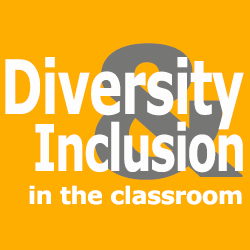A More Inclusive Campus: Pronouns and Preferred Names
 Consistently using personal pronouns and preferred names is key for creating a more inclusive campus culture. To support faculty and staff in using personal pronouns and preferred names, the CTLT has prepared this resource page and a page providing answers to frequently asked questions: A More Inclusive Campus: Pronouns and Preferred Names FAQ.
Consistently using personal pronouns and preferred names is key for creating a more inclusive campus culture. To support faculty and staff in using personal pronouns and preferred names, the CTLT has prepared this resource page and a page providing answers to frequently asked questions: A More Inclusive Campus: Pronouns and Preferred Names FAQ.
A More Inclusive Campus: Pronouns and Preferred Names
This page provides guidance to support faculty and staff in using student pronouns and preferred names. A companion page providing answers to frequently asked questions is also available at this link:
A More Inclusive Campus: Pronouns and Preferred Names FAQ
Background
In March of 2019, Cal Poly students, staff, and faculty began being listed in the Cal Poly directory under their preferred name, recognizing the importance of names to individual identity. In January 2020, Cal Poly Canvas users were given the option of indicating their personal pronouns in their Canvas user settings. Beginning in November 2021, all students will be able to provide the university with personal pronouns through the campus data systems. Once updated, pronouns will display on classroom and other administrative rosters and in some essential student service systems across the university.
Preferred Names
Students can currently indicate their preferred name through the campus data systems. In contrast to a legal name, which must be used for official purposes, a preferred name refers to the name that an individual uses in their day-to-day life. Preferred names are also known as lived names or names in use. Individuals may choose preferred names for many reasons, including nicknames, names that reflect cultural, religious, or familial preference/practice, names that students select for campus use because people mispronounce their given/birth names, or names that accurately reflect a person's gender identity (whether they have legally changed their name or not).
It is important that faculty and staff use and correctly pronounce students’ preferred names. For more information on how to remember and practice the pronunciation of students’ names see:
Personal Pronouns
Personal pronouns refer to language construction sets used in place of nouns and align with how an individual chooses to be referred to by others—an example of a pronoun set is she/her/hers (this includes the pronoun subject, object, and possessive). In day-to-day speech we use personal pronouns to refer to others, particularly when speaking in the third person.
Personal pronouns often infer the gender of the person being discussed. Making assumptions about another person’s gender and personal pronouns can lead to inadvertent misgendering (using the wrong gender and pronouns for another person), which is particularly harmful and exclusionary for our transgender and nonbinary students.
In order to avoid making assumptions and misgendering students, it is important to use the personal pronouns students have indicated either through an in-class survey or in the student information system. More information about personal pronouns can be found at:
- Pronouns: Frequently Asked Questions resource page
- MyPronouns.org
- Cal Poly's Pronouns Matter Website
Why is it important for Cal Poly faculty, staff, and students to respect personal pronouns?
Asking Cal Poly community members what their personal pronouns are and consistently using correct pronouns is one of the most basic ways to show your respect for an individual’s gender identity. Since you cannot always know what someone's personal pronouns are by simply looking at them, it is best to share your own pronouns and to ask others to share their pronouns with you. Correctly using a student’s pronouns can determine whether an individual feels respected and included at Cal Poly or not.
When an individual, particularly a transgender or non-binary individual, is referred to with the wrong pronoun (misgendered), it can make them feel disrespected, invalidated, dismissed, alienated, or hurt. Not respecting a student’s personal pronouns and gender identity is not only psychologically harmful, but feelings of exclusion will make it more difficult for students to be engaged learners in your classroom and may affect their academic success at Cal Poly.
A key element of creating a safe space for people in terms of gender identities is the respectful use of personal pronouns. Correctly using personal pronouns is not only a matter of respect, but also imperative from a policy perspective. The California State University's nondiscrimination policy includes protections for sex, gender identity (including transgender), and gender expression. Specifically, CSU Executive Orders 1095, 1096, and 1097 prohibit discrimination on the basis of gender identity. Additionally the California Gender Recognition Act (SB 179) went into full effect in January 2019. Documenting preferred names and personal pronouns is one way the University is practicing greater inclusion.
Respectful use of personal pronouns is also in alignment with our campus’s:
To learn more about frequently asked questions related to personal pronouns and preferred names, please visit A More Inclusive Campus: Pronouns and Preferred Names FAQ.



